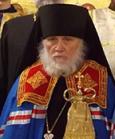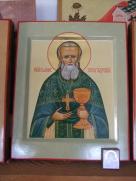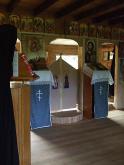Sunday, November 15, 2015
Epistle from the Synod of Bishops
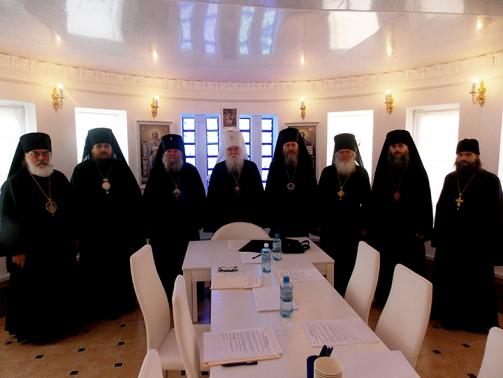
Epistle
of The Synod of Bishops of the Russian Orthodox Church Abroad
to the faithful children in the homeland and in the diaspora
Reverend hierarchs and pastors, monastics and lay people!
Having gathered in these days in the God-preserved city of Odessa, the members of the Synod of Bishops note that in most of our parishes, scattered around the world, spiritual life proceeds steadily and successfully. However, at the same time, in some areas of the territory of the Russian Federation, and partly in other places, a time of particular trial has arrived for our Church. In these few parishes, unfortunately, disturbance and mutual accusations have nearly become norm. “And whether one member suffer, all the members suffer with it” (1 Cor 12:26) - the Apostle writes. Therefore, pain in one area of our Church is passed on to Her entire body.
We all know that the unity of the Church is based on unity of faith and love between Her faithful children. At present we have a unity of faith, as witnessed by the signing of a Statement of Confession together with our sister Churches – the Greek, Bulgarian and Romanian. This is a confirmation of the right path along which our Church is proceeding, together with the representatives of other confessing Orthodox Churches for more than twenty years. This unity is a great value of which we must cherish. We must make every effort so as not to disturb it.
Today it is possible to confidently assert that the unity of confession of the Orthodox Faith unites us. There is no reason to reproach our Bishops of confessing some kind of heresy. Therefore we must speak about the fact that we are faced with a serious test of the strength of our brotherly love. Of course, it must be taken into account that the fratricidal war in the Ukraine largely furthers this. In a few cases it has changed brotherly love into hatred. Among our faithful children there also those who stand on opposite sides of this conflict. Sometimes this conflict sometimes is even directly transferred into the bosom of the Church. Lamentably, this becomes a cause of unjust and uncanonical division. But, “Is Christ divided?” (1 Cor 1:13). Is it possible that there exist values on earth that are worth more than unity in Christ? Physical war should not go transform into “spiritual battle” between Christians the same faith. Some of our brothers unfortunately forget this, being overly enthusiastic about political slogans.
Additionally, we constantly hear reproaches originating from the hurt pride of some of our former brothers. Likewise from those of our children who, while not fully comprehending the essence of the issues, attempt to defend those on whom the hierarchy has imposed fair interdicts. Those who have been rebuked, rather than changing their behaviour, have become hardened. Not only do they not make any effort or attempt to regularise their situation – instead they continue insulting and blaming the Bishops and brethren. In the words of the Apostle: “Let no corrupt communication proceed out of your mouth, but that which is good to the use of edifying, that it may minister grace unto the hearers.” (Eph 4:29). For this reason, the Synod of Bishops urges them to lay aside all their offensive statements with regards to the hierarchs, and to ask for their forgiveness. Otherwise, these statements will remain between us forever, like an insurmountable wall.
Not wanting to expose internal disputes to general spectacle, we have given the ruling Bishops the task to meet with the clergy for more detailed explanations where necessary. The clergy in turn will relate the opinion of the Synod to those parishioners who are interested.
Today we appeal to all the faithful children of the Russian Orthodox Church Abroad: Our Lord Jesus Christ constantly repeated: “Peace be with you.” These words are addressed also to all of us. Against the background of a general hostility and apostasy, which now has spread all over the earth, we must witness that we deserve to be called Christians – the disciples of the Divine Teacher. We must remember that we are the children of peace, not war. Remembering this, let us make every effort to maintain our unity.
Chairman of the Synod:
+ Metropolitan Agafangel
The members of the Synod:
+ Archbishop Andronik
+ Archbishop George
+ Bishop Athanasius
+ Bishop Gregory
+ Bishop Kyril
+ Bishop Nikon
Wednesday, August 26, 2015
The way of light and the way of darkness
The way of light
The way of light, then, is as follows. If any one desires to travel to the appointed place, he must be zealous in his works. The knowledge, therefore, which is given to us for the purpose of walking in this way, is the following. Thou shalt love Him that created thee: thou shalt glorify Him that redeemed thee from death. Thou shalt be simple in heart, and rich in spirit. Thou shalt not join thyself to those who walk in the way of death. Thou shalt hate doing what is unpleasing to God: thou shalt hate all hypocrisy. Thou shalt not forsake the commandments of the Lord. Thou shalt not exalt thyself, but shalt be of a lowly mind. Thou shalt not take glory to thyself. Thou shalt not take evil counsel against thy neighbour. Thou shalt not allow over-boldness to enter into thy soul. Thou shalt not commit fornication: thou shalt not commit adultery: thou shalt not be a corrupter of youth. Thou shalt not let the word of God issue from thy lips with any kind of impurity. Thou shalt not accept persons when thou reprovest any one for transgression. Thou shalt be meek: thou shalt be peaceable. Thou shalt tremble at the words which thou hearest. Thou shalt not be mindful of evil against thy brother. Thou shalt not be of doubtful mind as to whether a thing shall be or not. Thou shalt not take the name of the Lord in vain. Thou shalt love thy neighbour more than thine own soul. Thou shalt not slay the child by procuring abortion; nor, again, shalt thou destroy it after it is born. Thou shalt not withdraw thy hand from thy son, or from thy daughter, but from their infancy thou shalt teach them the fear of the Lord. Thou shalt not covet what is thy neighbour’s, nor shalt thou be avaricious. Thou shalt not be joined in soul with the haughty, but thou shalt be reckoned with the righteous and lowly. Receive thou as good things the trials which come upon thee. Thou shalt not be of double mind or of double tongue, for a double tongue is a snare of death. Thou shalt be subject to the Lord, and to [other] masters as the image of God, with modesty and fear. Thou shalt not issue orders with bitterness to thy maidservant or thy man-servant, who trust in the same [God ], lest thou shouldst not reverence that God who is above both; for He came to call men not according to their outward appearance, but according as the Spirit had prepared them. Thou shalt communicate in all things with thy neighbour; thou shalt not call things thine own; for if ye are partakers in common of things which are incorruptible, how much more [should you be] of those things which are corruptible! Thou shalt not be hasty with thy tongue, for the mouth is a snare of death. As far as possible, thou shalt be pure in thy soul. Do not be ready to stretch forth thy hands to take, whilst thou contractest them to give. Thou shalt love, as the apple of thine eye, every one that speaketh to thee the word of the Lord. Thou shalt remember the day of judgment, night and day. Thou shalt seek out every day the faces of the saints, either by word examining them, and going to exhort them, and meditating how to save a soul by the word, or by thy hands thou shalt labour for the redemption of thy sins. Thou shalt not hesitate to give, nor murmur when thou givest. “Give to every one that asketh thee,” and thou shalt know who is the good Recompenser of the reward. Thou shalt preserve what thou hast received [in charge], neither adding to it nor taking from it. To the last thou shalt hate the wicked [one]. Thou shalt judge righteously. Thou shalt not make a schism, but thou shalt pacify those that contend by bringing them together. Thou shalt confess thy sins. Thou shalt not go to prayer with an evil conscience. This is the way of light.
The way of darkness
But the way of darkness is crooked, and full of cursing; for it is the way of eternal death with punishment, in which way are the things that destroy the soul, viz., idolatry, over-confidence, the arrogance of power, hypocrisy, double-heartedness, adultery, murder, rapine, haughtiness, transgression, deceit, malice, self-sufficiency, poisoning, magic, avarice, want of the fear of God. [In this way, too,] are those who persecute the good, those who hate truth, those who love falsehood, those who know not the reward of righteousness, those who cleave not to that which is good, those who attend not with just judgment to the widow and orphan, those who watch not to the fear of God, [but incline] to wickedness, from whom meekness and patience are far off; persons who love vanity, follow after a reward, pity not the needy, labour not in aid of him who is overcome with toil; who are prone to evil-speaking, who know not Him that made them, who are murderers of children, destroyers of the workmanship of God; who turn away him that is in want, who oppress the afflicted, who are advocates of the rich, who are unjust judges of the poor, and who are in every respect transgressors.
Epistle of the Holy Apostle Barnabas, 1st century
Sunday, April 12, 2015
CHRIST IS RISEN! ХРИСТОC ВОСКРЕСЕ!
Дорогие архипастыри и пастыри, монашествующие и мирские, братья и сестры!
 Смерть приходит, когда отступает жизнь. Если, по тем или иным причинам, нет возможности поддерживать движение жизни – то человек умирает. Но, на этом процесс не оканчивается - после разрушается сам организм, бывший носителем жизни, до того состояния, чтобы от прежнего присутствия жизни не оставалось и следа. Это закономерный процесс, положенный Богом – от высокоорганизованного живого организма – к мертвой материи, которая в Книге Бытия названа «землею». И, казалось бы, невозможно это изменить. Но Бог, сотворивший человека, «побеждает естества чин», как сказано в Каноне преп. Андрея Критского. Господь наш Иисус Христос в земной жизни показал множество раз Своими чудесами, что Он имеет власть над мертвой материей, и, будучи Творцом Вселенной, Своей Божественной волей может изменять эту материю. И, даже, вернуть жизнь праху земному, от которого она была взята ранее – из низшей материи вновь создать высшие ее формы – из мертвой «земли» возсоздать человека.
Смерть приходит, когда отступает жизнь. Если, по тем или иным причинам, нет возможности поддерживать движение жизни – то человек умирает. Но, на этом процесс не оканчивается - после разрушается сам организм, бывший носителем жизни, до того состояния, чтобы от прежнего присутствия жизни не оставалось и следа. Это закономерный процесс, положенный Богом – от высокоорганизованного живого организма – к мертвой материи, которая в Книге Бытия названа «землею». И, казалось бы, невозможно это изменить. Но Бог, сотворивший человека, «побеждает естества чин», как сказано в Каноне преп. Андрея Критского. Господь наш Иисус Христос в земной жизни показал множество раз Своими чудесами, что Он имеет власть над мертвой материей, и, будучи Творцом Вселенной, Своей Божественной волей может изменять эту материю. И, даже, вернуть жизнь праху земному, от которого она была взята ранее – из низшей материи вновь создать высшие ее формы – из мертвой «земли» возсоздать человека.
Жизнь уничтожается только грехом – который есть смертельный яд для «всякого дыхания». И победа над грехом – есть победа над смертью. Пасха – это ПРЕОДОЛЕНИЕ. Преодоление сил зла – многочисленных диавольских козней на пути к Богу. Преодоление множества соблазнов и препятствий, от даже совсем незаметных до самого непреодолимого препятствия на этом пути – смерти. Что-то мы можем победить и сами – касающееся наших личных слабостей и искушений. Но главное препятствие – смерть, мы самостоятельно преодолеть не в силах, поскольку оно касается человеческого естества, которое подвластно только Богу.
Вечный Бог никогда не умирал и не воскресал, но человек, неслитно и нераздельно соединенный с Богом и Единосущный с Ним – Иисус Христос – родился, умер и воскрес. И Он, Господь наш, свидетельствует о том, что Бог и других людей может воскресить, как воскресил Лазаря. Но Бог потому совершил это чудо, что Лазарь любил Господа. Любовь ко Христу – вот единственный залог и единственное условие нашего воскресения – это то, что безсмертно и никогда в человеке умереть не может. Поэтому, главное для нас, христиан – любовь: «Возлюбим друг друга, да единомыслием исповемы Отца и Сына и Святаго Духа, Троицу Единосущную и Нераздельную!».
Воистину, Воскресший Христос – Сын Божий есть!
Пасха Христова 2015 года, Одесса
Sunday, February 1, 2015
Metroplitan Anthony: Sermon on the day of the Publican and Pharisee (1934)
God, I thank Thee, that I am not as other men are, extortioners, unjust, adulterers, or even as this publican.
Luke 18:11
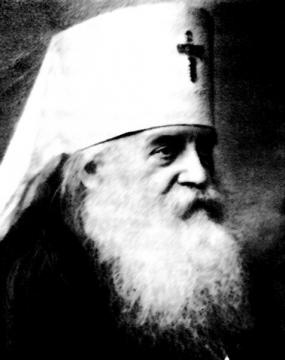 To understand the meaning of this parable, we must first eliminate the erroneous interpretation of it. This erroneous interpretation dominates in our secular society, which is not averse to mentioning it in idle talk about the Pharisee in question; but in a totally wrong view of his personality. For our contemporaries, the very word “Pharisee”, before they are conscious or it, conjures an understanding of Pharisees in general as conscious hypocrites…. evil, envious, and dissolute.
To understand the meaning of this parable, we must first eliminate the erroneous interpretation of it. This erroneous interpretation dominates in our secular society, which is not averse to mentioning it in idle talk about the Pharisee in question; but in a totally wrong view of his personality. For our contemporaries, the very word “Pharisee”, before they are conscious or it, conjures an understanding of Pharisees in general as conscious hypocrites…. evil, envious, and dissolute.
Of course, this description is quite applicable to many Pharisees, perhaps the majority, but this is not what our Saviour described in His parable.
First of all, note that the aforementioned Pharisee did not ascribe righteousness to himself. Rather, he thanked God for it, the giver of spiritual wealth. Modern hypocrites and critics of phariseeism express themselves differently: “I am an honorable man, and certainly honest, and therefore I do not allow anyone to step on my toes”. This kind of admission sets the modern “gentleman” a lot lower than the Pharisee. The latter listed his virtues in the face of the all-seeing God, and, of course, could not lie. Consequently, his error was not in inaccuracy or falsity of confession, but rather, in his relation to his own conscience.
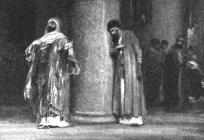 In order to clarify where the mistake or sin lies, we ask our listeners to compare our earthly life with the path of a traveler, who was ordered to go somewhere he did not know. That traveler will be in the right who does not look back at the way, but rather, looks forward, thinking how much he has left to go, asking the help of God and remembering the words of Christ: “No man, having put his hand to the plough, and looking back, is fit for the kingdom of God. ” (Luke 9.62)
In order to clarify where the mistake or sin lies, we ask our listeners to compare our earthly life with the path of a traveler, who was ordered to go somewhere he did not know. That traveler will be in the right who does not look back at the way, but rather, looks forward, thinking how much he has left to go, asking the help of God and remembering the words of Christ: “No man, having put his hand to the plough, and looking back, is fit for the kingdom of God. ” (Luke 9.62)
At the same time, a good Christian should not leave off self-reproach. He should certainly not boast of the successes made in the spiritual life. Of course, this does not mean he should not pray with thanks to the Lord, for what sins or vices the Lord has already delivered him from. However, he should not forget that God would have sent him more abundant gifts of grace, if he only humbled himself, and prayed earnestly, repenting of the sins he happened to commit, forcing himself to new feats of combat against them.
That is what was absent in the aforementioned Pharisee. Therefore, the publican, who bitterly mourned over his sins went to his house more justified than the Pharisee, who was satisfied with his external virtues. Note that expression - more justified.
Hence, the Pharisee was not just boasting before God. He actually tried to please Him and to preserve his conscience pure.
From this it is clear that our whole life should be a constant forward movement, constantly coming closer to God, by the exercise virtue and dissatisfaction with ourselves.
This is what almost none of our secular theologians understand, and even a significant part of the spiritual ones.
Struggle against oneself, self-constraint and self-reproach – that is our way to the heavenly kingdom. If these inner struggles are present, then our whole life will gradually move towards perfection. May the Lord strengthen us in constant remembrance of the proverb we heard today.
Sermon pronounced by Metropolitan Anthony (Khrapovitsky) in 1934 in Sremsky Karlovcy.
Saturday, January 10, 2015
Nativity Epistle of the Right Reverend Andronik
Archbishop of Syracuse and St. Nicholas, Ottawa and Canada
(John 1:14)
Greetings on the Nativity of Christ and the coming New Year of 2015!
Dear in Christ pastors, clergy and faithful of the Russian Orthodox Church Abroad, greetings to all on the occasion of the great feast of the Nativity of the Incarnate Lord our Jesus Christ!
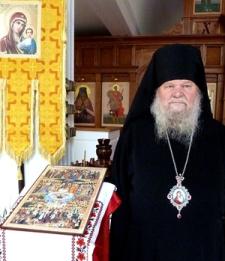 By God’s infinite love of mankind and to adopt mankind for Himself, the Son of God descended from heaven twenty centuries ago and was born in Judaic Bethlehem from the Ever-Virgin Mary. Though this glorious event took place among us so many years ago, each one of us from year to year still experiences it in his or her heart.
By God’s infinite love of mankind and to adopt mankind for Himself, the Son of God descended from heaven twenty centuries ago and was born in Judaic Bethlehem from the Ever-Virgin Mary. Though this glorious event took place among us so many years ago, each one of us from year to year still experiences it in his or her heart.
The best gift that we could bring to the newborn Christ child is our faithfulness to the Church and love of one another and to those who by imprudence find themselves over the side of the lifesaving vessel of the Church Abroad. Let us pray, brothers and sisters that we may not only in name, but in spirit become children of God, so that none of us may perish, but inherit eternal life.
In our time, when heresies and schisms befall the Church of Christ with such force, only our faithfulness to God, obedience to the Church and love of one another will help us overcome all our troubles.
At this time, when our hearts are overflowing with love, and our gratitude to God reverberates in our souls for His eternal grace to us, our lips cannot stay shut, but cry out,
“Glory to God in the highest, and on earth peace, good will toward men!”
Greetings on the feast!
+ANDRONIK
Archbishop of Syracuse and St. Nicholas, Ottawa and Canada
Thursday, January 8, 2015
Metropolitan Agafangel’s Nativity Epistle
Dear hierarchs and pastors, monastics and laity, brothers and sisters!
of His Eminence Metropolitan Agafangel,
First Hierarch of the Russian Orthodox Church Abroad
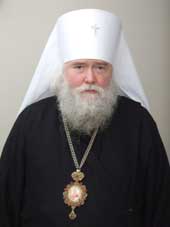 It has been a long time since we last had such a difficult year for our Church. This is because of the events which have shaken the world, which in turn resound very noticeably in our lives. Now, almost universally, the world has turned to war. “For nation shall rise against nation, and kingdom against kingdom: and there shall be famines, and pestilences, and earthquakes, in divers places. All these are the beginning of sorrows.” (Matthew 24.7-8). Indeed, we see firsthand the beginning of these tribulations - not so much physical as spiritual ones. We have reached the time when even those who are called to keep and observe Truth have stopped accepting “sound doctrine; but after their own lusts shall they heap to themselves teachers, having itching ears,” (2 Timothy 4:3). Everything is coming true - “Then shall many be offended, and shall betray one another, and shall hate one another” (Matthew 24.10). The ever-present apostasy is coming upon us like the approaching night, gradually and inevitably absorbing the souls of men. Less and less souls warm themselves around the spiritual beacons of intact faith. Even the visible, earthly Church is harder to find in the ruling chaos surrounding Her. As we enter the period of Passion Week of human history, we can only observe what is happening. In our weakness we are not able to prevent the end of time.
It has been a long time since we last had such a difficult year for our Church. This is because of the events which have shaken the world, which in turn resound very noticeably in our lives. Now, almost universally, the world has turned to war. “For nation shall rise against nation, and kingdom against kingdom: and there shall be famines, and pestilences, and earthquakes, in divers places. All these are the beginning of sorrows.” (Matthew 24.7-8). Indeed, we see firsthand the beginning of these tribulations - not so much physical as spiritual ones. We have reached the time when even those who are called to keep and observe Truth have stopped accepting “sound doctrine; but after their own lusts shall they heap to themselves teachers, having itching ears,” (2 Timothy 4:3). Everything is coming true - “Then shall many be offended, and shall betray one another, and shall hate one another” (Matthew 24.10). The ever-present apostasy is coming upon us like the approaching night, gradually and inevitably absorbing the souls of men. Less and less souls warm themselves around the spiritual beacons of intact faith. Even the visible, earthly Church is harder to find in the ruling chaos surrounding Her. As we enter the period of Passion Week of human history, we can only observe what is happening. In our weakness we are not able to prevent the end of time.
But we remember that the historical birth of Christ occurred in almost the same kind of impenetrable night, during a time of captivity, apostasy and national poverty, when prophecies were silent, and the priesthood and leaders of the people had degenerated into Pharisees and scribes. The Incarnation of God pierced the surrounding spiritual darkness as the saving beam of a lighthouse during a storm of complete destruction. Suddenly a guiding star was revealed to travelers astray. A highly anticipated door of freedom, was suddenly flung open, leading out from the crude and hateful prison!
If we are with God, then we have nothing to fear! I urge you, my dear ones, to spiritual renewal by the current Nativity of Christ! May it shine in every heart with the unwaning light of Divine wisdom! So that we, despite of the fallen and sinful world, together with the entire Holy Church, would exclaim in a single triumphant voice: O Life-Giver, Christ our God, glory to Thee!
+ Metropolitan Agafangel
Odessa, Nativity of Christ, 2014-2015.
Wednesday, October 15, 2014
On sins of the tongue
On the conduct of a pure heart
Treat every man not with flattery, but simply, just as you do yourself. As you appear to him outwardly, be so inwardly as well; and what you say to him and what you have on your lips must be in your heart also. For flattery and treachery are the works of pestilent people, and the devil lives in their heart teaching them flattery and treachery so as to deceive us.
Keep, then, from treating your neighbour craftily and treacherously, lest you give place to the devil in your heart, and lest he overcome you and take you captive.By no means offend anyone
Be extremely careful not to offend anyone in word or deed, for it is a grave sin. When someone is offended, God, Who loves the man, is also offended, for there can be no offending man without offending God. Whoever sins against a man, also sins against God. This is a serious matter, as you can see for yourself. And when you offend your neighbour, straightway humble yourself before him and beg forgiveness of him with humility, lest you fall under God’s just condemnation.Do not pry into other people’s affairs
Keep from prying into other people’s affairs, for such prying gives occasion for slander, judgement and other grevious sins. Why do you need to be concerned about others? Know and examine your own self.
Recall your own past sins and purge them with repentance and contrition of heart, and you will not look at what other people do. Look often into your own heart and examine that most ruinous evil hidden there, and you will have sufficient material for investigation. For we can never examine our heart without knowing precisely that every evil is contained in it.
This investigation is profitable to you, for it gives birth to humility and to fear and watching over one’s own self, and to sighing and prayer to God. But examination of the sins of others is the beginning of every iniquity and it is a curiosity hateful to God and man. Then guard yourself against it.
St Tikhon of Zadonsk (18th century)

